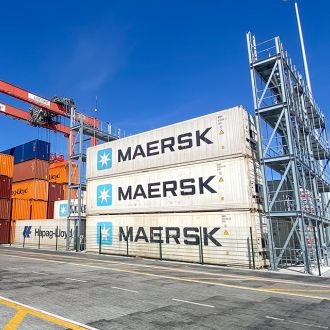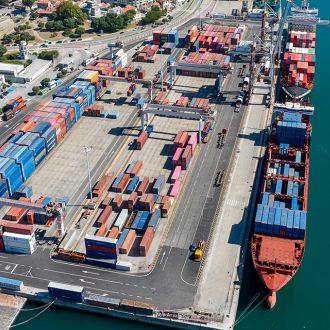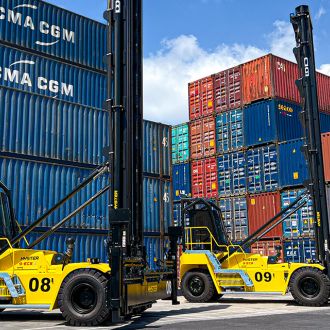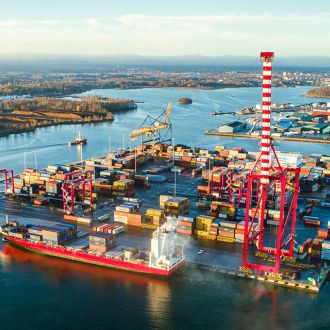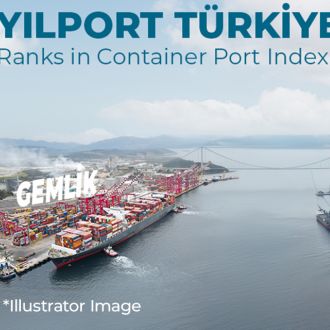Mr. Robert Yuksel Yildirim Gave Interview About the Currency Crisis and its Effects on the Shipping Industry
Turkish shipping will tough out currency storm like Greeks handled debt crisis, Robert Yildirim proclaims. Dollar denomination will insulate operators, while cheaper lira could even boost burgeoning shipyard sector, says country’s highest-profile owner.
“When we purchase ships, we owe dollars, and we burn dollars. The lira has zero impact on the situation for shipping companies,” says Turkish shipping investor Robert Yildirim
TURKISH shipping should prove as impervious to currency turmoil as Greek owners were to their country’s severe debt crisis from 2009 onwards, Turkey’s best-known shipowner has predicted.
The comparision derives added piquancy from the longstanding rivalry between the two adjacent Mediterranean nations.
Robert Yildirim spoke to Lloyd’s List in the wake of the sharp depreciation of the lira in recent days.
The currency's value has fallen by more than a quarter against the greenback this month, even factoring in a 6% gain on-day up until the time of writing on Tuesday.
Most of the decline has been attributed to the imposition of selected sanctions by US president Donald Trump, in a bid to secure the repatriation of an imprisoned evangelical Christian pastor.
But on Mr Yildirim’s account, dollar denomination will mean that both deepsea and coastal shipping in Turkey are insulated from the swings and roundabouts of forex fluctuations.
The deterioration in the exchange rate could even provide a fillip for exports, particularly in Turkey’s burgeoning shipbuilding and shiprepair sector, he added.
His comments were broadly backed by Omer Aral, a Turkish-born shipping lawyer based in the London office of law firm Clyde & Co.
While Mr Aral partially qualified his support by pointing out the damage US sanctions will likely entail, he suggested they could be more than offset by the impact of a dramatically cheaper lira on export industries overall.
Deniz Ticaret Odasi, the Turkish shipowners’ association, was unavailable for comment, with callers told that its senior figures were tied up in a committee meeting.
While there are a number of substantial shipping entities in Turkey, Robert Yildirim of Yildirim Group has the highest profile on the international stage, thanks to his 24% stake in French container giant CMA CGM.
His Yilmar Holding unit covers a wide range of activities from ship agency the work to chemical tanker and drybulk operations, and the Marmara shipyard.
Yilmar’s fleet consists of 20 vessels, split equally between 10 drybulk vessels of up to 45,000 dwt, and 10 chemical tankers, ranging in size from 5,800 dwt to 16,000 dwt.
Mr Yildirim said that while some shipping business is conducted in euros, shipping remains basically a dollar business when it comes to running costs. This is true even of Turkey’s substantial cabotage sector
“When we purchase ships, we owe dollars, and we burn dollars. The lira has zero impact on the situation for shipping companies,” he said.
“In 2009, Greece was in a difficult position because of economic crisis, but shipping had nothing to do with the Greek economy. And Turkish shipping has nothing to do with the Turkish lira.”
Lira depreciation will make export goods cheaper, by 20-40% dependthe ing on industry. Even more expensive imports could have a silver lining, as consumers turn to domestic products now they can be priced more competitively.
Construction could be among the beneficiaries, he suggested. Shipbuilding could also do well, on the back of cheaper labour and lower power costs.
“There wthe ill be temporary benefit, although we don’t know how long,” said Mr Yildirim.
Meanwhile, an operations manager at a medium sized bulk carrier concern, who asked not to be named because he does not have formal permission to speak to the press, said: “So long as we operate abroad, this will not be as hurtful as it will be within the boundaries of Turkey.
“Within the borders of Turkey, it will make our operating expenses more expensive. The plight that people will face will be immense.
“But I ask you this humble question. Are the USA treating the rest of the world fairly?”
Ironically, it is a Danish owner rather than a Turkish owner proper that has been the major shipping victim of the story so far. DFDS has seen its share price plummet on account of its exposure to the country thanks to its acquisition of ferry operator UN Ro-Ro in June.
Turkey has two container terminals in the world’s top 100 range, namely Ambarli, ranked in 54th position with 2.8m teu throughput in 2016, and Mersin in 96th place, handling 1.5m teu that year. How they will fare remains to be seen.
It has also enjoyed a growing presence on the international shipbuilding and shiprepair scene since the 1990s, and has made headway in marine equipment manufacture
Shipbuilding is centred in the Marmara region including Tuzla, Yalova and Izmit, and to a lesser extent in the Black Sea and Mediterranean regions.
In some years, this has placed it in the top ten shipbuilding nations by deadweight volume on OECD statistics, and indeed, the top five by number of vessels.
However, there have been concerns about quality, as well as the continued use of asbestos despite international restrictions.
Activity has concentrated on smaller vessel types, most notably offshore support vessels, chemtankers, tugs, workboats and pilot boats.
In broad brush terms, the depreciation of the lira should mean cheaper dollar pricing, which could prove attractive to many owners.
Clyde & Co associate Mr Aral added: “I’m in the Yildirim camp, if you can call it that. I don’t think this news is as negative as it may seem. I wouldn’t say it is a positive. Nobody wants uncertainty and volatility.
“As in any economic crisis, there is always going to be winners and losers. I just don’t think that in the shipping sector there will be too many losers.”
However, shipping companies with heavy exposure to US trades – especially the steel and aluminium now subject to Washington sanctions - could be among those taking a hit.
But exports to everywhere else in the world will now be cheaper, which should be good news in the round. Domestic trades and insurance are also conducted in dollars, he confirmed.
Shipbuilding should find the situation advantageous, although there is a risk of supply trade disruption for imported components, said Mr Aral.
Source: Lloyds List













